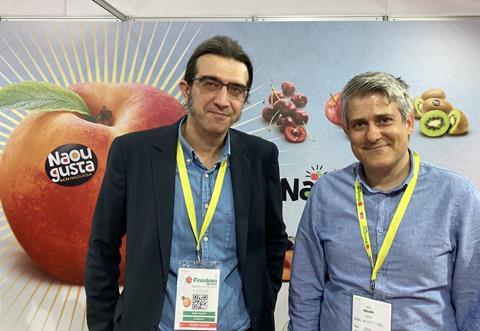The north of Greece is known for its reliable rainfall, but this year’s abnormally warm, dry weather is a worry for peach and nectarine growers preparing for the new campaign
Greece just experienced its warmest ever winter, according to Kostas Lagouvardos, a leading weather scientist from the Athens national observatory, with the highest average temperatures recorded for the months of December, January and February.
The rising temperature trend is an issue for the country’s fruit producers, and the continued warm, dry weather is of immediate concern for cherry, peach and nectarine producers gearing up for the new season.
“We have had no hail or frost damage so far this season, but it has been very warm and very dry, even by Greek standards,” said Thanos Economou of producer cooperative ACN Naoussa. “We don’t want to be in a situation like Spain last year, with long-lasting droughts. This will affect quantities.”

According to Economou, the lack of rain caught everybody off guard. “Everyone expected it to rain at some point, but it never really arrived this year,” he said. “The authorities weren’t expecting water to be in demand so early. If we have a lack of water for peaches and nectarines this season, it will be the first time in my 20 years in the business.”
However, an even bigger problem than the climate, at least in the short term, may be the shortage of workers to pick in the fields and pack in the packhouses. “The primary issue at the moment is with seasonal workers,” confirmed Economou. “Seasonal work was mostly covered by people from Albania, but they have now gone elsewhere, to Italy, the UK and other places. We have tried to get workers from Egypt and from Asia, but it’s a difficult task due to the need for visas and work permits.”
Even when workers can be attracted to the farm, pay demands are higher. “There are alternatives for such workers,” said Economou. “We have an ageing workforce in Greece, so many people either don’t want to work, or they prefer an easier job to packhouse work, like serving coffee on Mykonos or one of the other islands.”
Of course, Greek peach and nectarine producers are no stranger to a challenge. The loss of the Russian market a decade ago required a major scramble for alternative export markets, as soon as the likely longevity of the embargo became apparent.
“Greek producers have adjusted since the embargo, lowering quantities and expanding into different products,” said Economou. “We used to do around 20,000 tonnes of peaches and now we’re doing 10,000 tonnes. We are still mainly focused on peaches as a cooperative, but we do other items as well. We do a lot of kiwifruit and we have 2,000 tonnes of cherries. Our farmers have planted a lot.”
The cooperative’s premium PDO peaches are sold under the NaouGusta brand, with other premium fruits including cherries adopting the NaouFruta label.
The season for Greek cherries begins at the end of May or early June, around a month earlier than peaches and nectarines. “The main concern at the moment is the lack of water,” said Economou. “In Spain, they have dams and other infrastructure to conserve water, and still they have issues. In Greece, all the water runs into the sea. We have always been OK up to now, but one day that may well change.”



